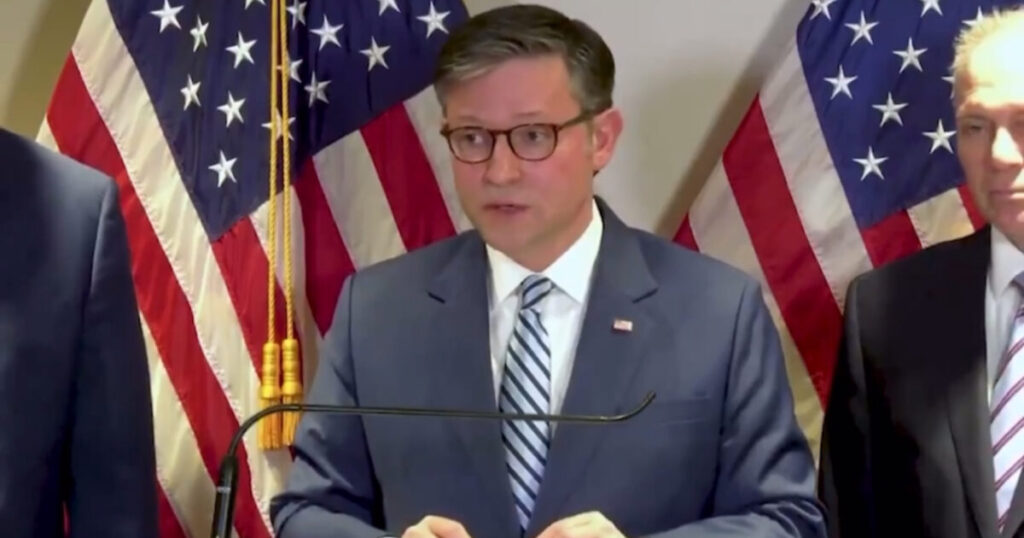House Speaker Mike Johnson made headlines during a press conference on Wednesday when he announced that the House would no longer approve additional aid to Ukraine, a shift in policy expected in light of former President Donald Trump’s anticipated victory and forthcoming inauguration. This announcement adds fuel to ongoing tensions within the Republican Party, particularly among members of the Freedom Caucus, who have expressed dissatisfaction with Johnson’s leadership, labeling him an “abysmal failure.” Backlash against Johnson has been growing, culminating in earlier attempts by representative figures such as Marjorie Taylor Greene, Thomas Massie, and Paul Gosar to challenge his position as Speaker. Their grievances largely revolve around Johnson’s perceived failure to fulfill promises relating to government spending and foreign aid, particularly in support of Ukraine.
Compounding the criticism, Johnson’s tenure has coincided with controversial legislative maneuvers that drew more bipartisan support from Democrats than Republicans. Specifically, his leadership resulted in a $1.2 trillion spending bill, which many Republicans viewed as a capitulation that contradicted core party principles. Additionally, he endorsed the reauthorization of warrantless searches under the Foreign Intelligence Surveillance Act (FISA), a point of significant concern for civil liberties advocates. Johnson also approved a significant infusion of $60 billion in taxpayer funds to Ukraine, a move that directly opposes Trump’s stance on the issue. While Johnson’s actions align with President Biden’s agenda, they fueled resentment among many conservatives who argue that this funding exacerbates wasteful government expenditure.
Despite attempts to remove him from office, Johnson managed to retain his position after a vote where only 11 out of 197 Republicans cast their votes to support Greene’s motion. In personnel terms, the overwhelming majority of Republicans and Democrats—196 Republicans and 163 Democrats—voted against the motion, showing a significant level of support for Johnson amid the turmoil. This episode illustrates the fragmented state of the Republican Party, where factions with diverging priorities often clash. This vote showcased Johnson’s endurance amidst adversity, yet frustrations simmer within elements of his party, indicating that his leadership may still come under scrutiny as time progresses.
Recently, Johnson has demonstrated a willingness to assert his authority, as evidenced by his reaction to debates about gender identity and biological sex. He made a bold declaration affirming traditional views about gender, stating, “A man is a man, and a woman is a woman.” Responding to concerns about restroom access on Capitol Hill, he moved to implement rules prohibiting biological men from using women’s restrooms, resonating with conservative constituents who view this stance as a reaffirmation of established social norms. This firm position on gender issues not only highlights Johnson’s alignment with the conservative base of the party but also suggests a potential pivot towards more aggressive policies that diverge from the more moderate tendencies of his predecessor.
In the same press conference, Johnson was asked if he would heed President Biden’s request to attach an additional $24 billion in aid to Ukraine as part of a continuing resolution. Johnson’s response indicated a cautious approach; he stated he would defer to the judgment of the new Commander in Chief, referring to Trump. By emphasizing a shift in control and influence over foreign policy back to the newly elected president, Johnson projected the notion that Ukraine aid would not be prioritized in the near term. The war in Ukraine is evolving, and Johnson hinted at a potential shift in strategy as Trump’s leadership may redefine America’s course of action; this has implications not only for Ukraine but also for domestic policy discussions surrounding military and humanitarian aid.
Overall, the landscape of leadership within the Republican Party is in a state of flux, marked by internal dissent and external pressures. Johnson’s move to halt further funding for Ukraine could represent a decisive shift towards a more isolationist approach, reflecting the sentiments of a significant faction of the party. This realignment might embolden other congressional figures who feel disenfranchised by the party’s recent spending initiatives, invigorating ongoing discussions about fiscal responsibility and prioritization of domestic over foreign concerns. The potential for conflict within the party suggests that Johnson’s days as Speaker might be fraught with challenges as he navigates legislative responsibilities alongside party dynamics.
As the political scene continues to evolve in light of Trump’s resurgence, the coming months will likely be critical for both Johnson’s leadership and the Republican Party as a whole. The interplay between his decisions, member dissent, and the broader implications of foreign aid on domestic priorities remains a complex balancing act. Johnson’s firm stance on social issues, mixed with a more cautious approach to international obligations, illustrates a leader attempting to reconcile divergent party factions while attempting to maintain operational control. The future of Republican leadership, especially in foreign policy and fiscal discipline, remains to be seen as they prepare for an era shaped by the re-emergence of Trump as a pivotal player in American politics.

